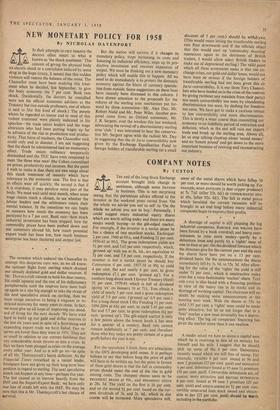COMPANY NOTES
By CUSTOS THE end of the long Stock Exchange account brought little change in sentiment, although some increase in business. This is not surprising seeing that the portentous advice offered to the investor in the weekend press varied from 'On the whole we advise you not to sell' to 'On the whole we advise you not to buy.' Personally, I could suggest many industrial equity shares which are worth selling today and there are many stocks worth buying—in the gilt-edged market. For example, if the investor is a surtax payer he has a choice of two excellent stocks, Exchequer 2 per cent. 1960 at 93,16., and Funding 24 per cent. 1956-61 at 90196. The gross redemption yields are 51 per cent. and 5.65 per cent. respectively, which, 'grossed up' with tax at 8s. 6d., are equivalent to 74 per cent. and 7.8 per cent. respectively. If the investor is not a surtax payer he should buy Conversion 4 per cent. 1957-58 at 994 to yield 4 per cent. flat and nearly 6 per cent. to gross redemption (7.1 per cent. 'grossed up'). For a medium long-dated stock I favour Treasury (Steel) 31 per cent. 1979-81 which is full of dividend (going 'ex' on January 9) at 714. You obtain a yield of nearly 5 per cent. and a gross redemption yield of 5.9 per cent. ('grossed up' 6.9 per cent.). For a long-dated stock I like Funding 31 per cent. 1999-2004 at 641 per cent. to yield 5.45 per cent. flat and 5.7 per cent. to gross redemption (6+ per cent. 'grossed up'). The gilt-edged market is only a few points above the lowest levels it has seen for a quarter of a century. Bank rate cannot remain indefinitely at 7 per cent. and therefore those who buy today are pretty certain of a good profit before the year is out.
* * *
For the speculator I think there are attractions in the OFS developing gold mines. It is perhaps tedious to say that before long the price of gold will have to be written up, but the point in favour of these gold shares is that the fall in commodity prices should mean the end of the rise in gold mining costs. The cheapest shares seem to be PRESIDENT BRAND at 50s., and PRESIDENT STEYN at 28s. 3d. The yield on the first is 10 per cent. and on the second 94 per cent. based on the cur- rent dividends of 5s. and 2s. 9d., which in due course will be increased. More speculative still, some of the metal shares which have fallen 50 per cent. or more should be worth picking up. For example, ROAN ANTELOPE (a dear copper producer) at 7s. 71d. (after 15s. 6d.) or CONSOLIDATED ZINC at 49s. (after 92s. 6d.). The fall in metal prices which heralded the current recession will be brought to an end long' before many industrial companies begin to improve their profits.
* A shortage of capital is still plaguing the big industrial companies. BABCOCK AND WILCOX have been forced by a bank overdraft and heavy com- mitments to raise more money—partly by a debenture issue and partly by a 'rights' issue of one-in-four at par. On the dividend forecast which the directors give for the current year and the next the shares have been put on a 13 per cent. dividend basis. On the announcement the shares immediately fell by 5s. 9d. to 52s. 3d. After allow- ing for the value of the 'rights' the yield is still under 54 per cent., which is unattractive today even for a once fashionable 'nuclear' share. TATE AND LYLE is also faced with a financing problem in view of the heavy rise in its stocks and its shortage of working capital. The chairman will no doubt be making some announcement at the meeting next week. With the shares at 55s. to yield 5.95 per cent. a 'rights' issue could be made quite attractive, but let us not forget that in a 'bear' market a new issue invariably has a depres- sing effect. The big oil companies' financing has given the market more than it can swallow.
* * *
A reader asked me how to invest a capital sum which he is receiving in lieu of an annuity for himself and his wife. I suggest that he should pick up some of the 6 per cent. Debentures recently issued which are still free of stamp. For example, VICKERS 6 per cent. issued at 96 and now 2 premium (25 per cent, paid) and MONSANTO 6 per cent. debenture issued at 95 now 11 premium (50 per cent. paid). Convertible debentures are, of course, more attractive and BRITISH PETROLEUM, 6 per cent. issued at 99 now 5 premium (20 per cent. paid) and ANGLO-AMERICAN 54 per cent. con- vertible unsecured loan stock issued and obtain- able at par (25 per cent. paid) should bs worth including in the portfolio.










































 Previous page
Previous page